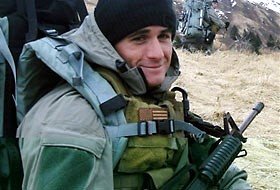Comrades recall Michael Monsoor's ultimate sacrifice: throwing himself on a live grenade

CORONADO, Calif. - Positioned by the only door to a sniper hideout in Ramadi, west of Baghdad, Petty Officer 2nd Class Michael A. Monsoor could have saved himself when insurgents lobbed a fragmentation grenade into the rooftop structure.
The grenade hit him in the chest and bounced to the floor. Instead of running for cover, the 25-year-old gunner dropped onto the explosive and used his body to shield three fellow Navy SEALs in the room with him. He probably saved their lives, but lost his own.
Monsoor became the second SEAL to die in Iraq when he was killed Sept. 29. Two SEALs next to Monsoor were injured and a fourth, who was 10-to-15 feet from the blast, was unhurt. The four-man team was working with Iraqi soldiers providing sniper security while U.S and Iraqi forces conducted missions in the area.
"He never took his eye off the grenade, his only movement was down toward it," said a 28-year-old lieutenant who sustained shrapnel wounds to both legs that day. "He undoubtedly saved mine and the other SEALs lives, and we owe him."
Four SEALs spoke to The Associated Press this week at the special force's West Coast headquarters in Coronado on condition of anonymity because their work requires their identities to remain secret.
The group remembered "Mikey" as a loyal friend, a quiet professional and a dedicated SEAL.
"He was just a fun-loving guy," said a 26-year-old petty officer 2nd class who went through the grueling 29-week SEAL training with Monsoor. "Always got something funny to say, always got a little mischievous look on his face."
Other SEALS described Monsoor as a modest and humble man who drew strength from his family and his faith. His father and brother are former Marines and he had a deep respect for other troops, said a 31-year-old petty officer 2nd class.
Prior to his death, Monsoor had already demonstrated courage under fire. On May 9 in Ramadi, the Garden Grove, Calif., native and another SEAL pulled a wounded team member to safety while bullets pinged off the ground around them. For his actions, Monsoor was posthumously awarded the Silver Star.
Monsoor's funeral was held Thursday at Fort Rosecrans National Cemetery in San Diego. He has also been submitted for an award for his actions the day he died.
A 35-year-old chief petty officer said Monsoor was primarily a heavy gunner, but also worked as a communications specialist. As a team member, he more than pulled his weight, frequently carrying his Mk-48 machine gun and a large radio.
SEALs have been involved in the war on terror since its start, said Navy spokesman Lt. Taylor Clark. There are about 2,300 of the elite fighters, based in Coronado and Little Creek, Va.
The Navy is trying to boost that number by 500 - a challenge considering more than 75 percent of candidates drop out of training, notorious for "Hell Week," a five-day stint of continual drills by the ocean broken by only four hours sleep total. Monsoor made it through training on his second attempt.
Clark said every SEAL is likely to deploy to Iraq or Afghanistan at some point. He said the relatively low number of deaths among SEALs in Iraq was a testament to their training.
SEAL casualties have been higher in Afghanistan. In June 2005, 11 SEALs died when a helicopter was shot down while ferrying reinforcements for troops pursuing al-Qaida militants near the border with Pakistan.
Five others have been killed in separate incidents in Afghanistan, Clark said.
The first SEAL to die in Iraq was Petty Officer 2nd Class Marc A. Lee, 28, who was killed Aug. 2 in a firefight while on patrol against insurgents in Ramadi.
From the San Jose Mercury News
Related Link:
Michael Monsoor dies during combat operations

<< Home